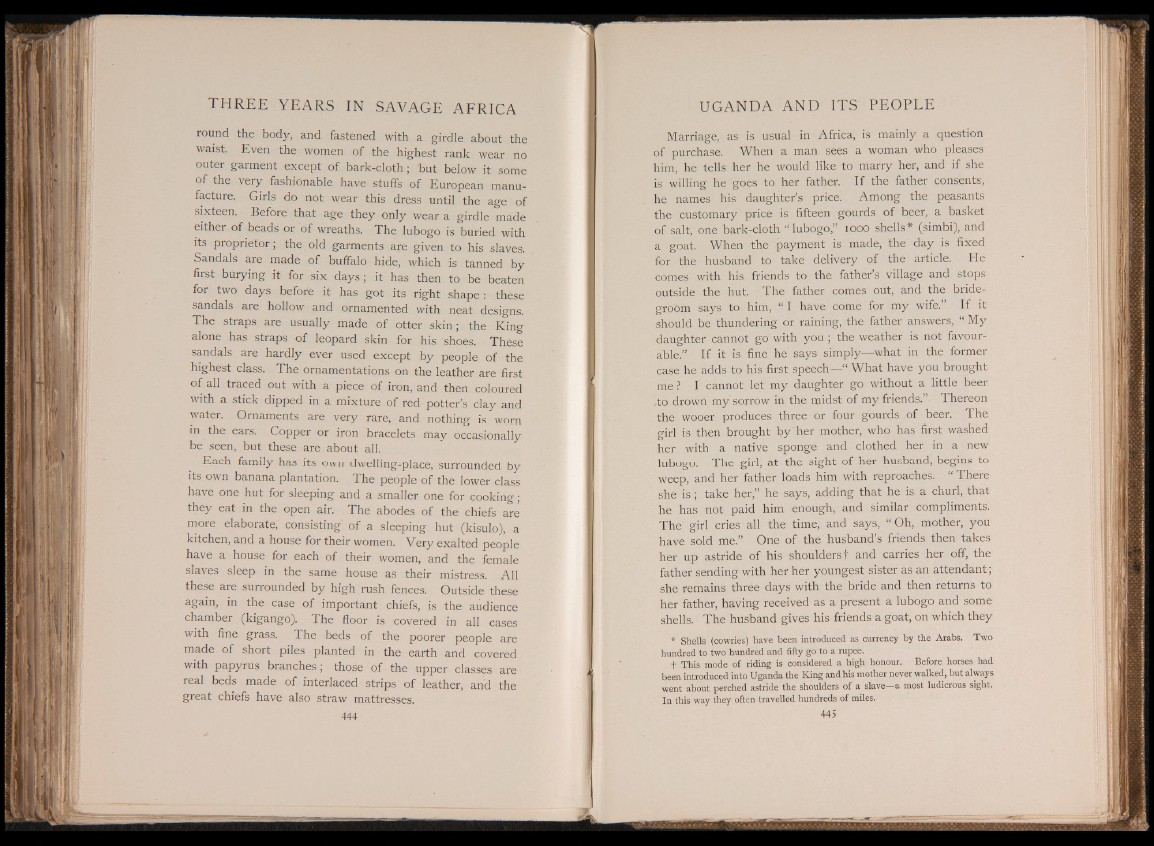
round the body, and fastened with a girdle about the
waist. Even the women of the highest rank wear no
outer garment except of bark-cloth ; but below it some
of the very fashionable have stuffs of European manufacture.
Girls do not wear this dress until the age of
sixteen. Before that age they only wear a girdle made
either of beads or of wreaths. The lubogo is buried with
its proprietor | the old garments are given to his slaves.
Sandals are made of buffalo hide, which is tanned by
first burying it for six days; it has then to be beaten
for two days before it has got its right shape: these
sandals are hollow and ornamented with neat designs.
The straps are usually made of otter skin; the King
alone has straps of leopard skin for his shoes. These
sandals are hardly ever used except by people of the
highest class. The ornamentations on the leather are first
of all traced out with a piece of iron, and then coloured
with a stick dipped in a mixture of red potter’s clay and
water. Ornaments are very rare, and nothing is worn
in the ears. Copper or iron bracelets may occasionally
be seen, but these are about all.
Each family has its own dwelling-place, surrounded by
its own banana plantation. The people of the lower class
have one hut for sleeping and a smaller one for cooking;
they eat in the open air. The abodes of the chiefs are
more elaborate, consisting' of a sleeping hut (kisulo), a
kitchen, and a house for their women. Very exalted people
have a house for each of their women, and the female
slaves sleep in the same house as their mistress. All
these are surrounded by high rush fences. Outside these
again, in the case of important chiefs, is the audience
chamber (kigango). The floor is covered in all cases
with fine grass. The beds of the poorer people are
made of short piles planted in the earth and covered
with papyrus branches; those of the upper classes are
real beds made of interlaced strips of leather, and the
great chiefs have also straw mattresses.
444
Marriage, as is usual in Africa, is mainly a question
of purchase. When a man sees a woman who pleases
him, he tells her he would like to marry her, and if she
is willing he goes to her father. If the father consents,
he names his daughter’s price. Among the peasants
the customary price is fifteen gourds of beer, a basket
of salt, one bark-cloth “ lubogo,” iooo shells* (simbi), and
a goat. When the payment is made, the day is fixed
for the husband to take delivery of the article. He
comes with his friends to ¡5 the father’s village and stops
outside the hut. The father comes out, and the bridegroom
says to him, “ I have come for my wife.” If it
should be thundering or raining, the father answers, “ My
daughter cannot go with you ; the weather is not favourable.”
If it is fine he says simply—what in the former
case he adds to his first speech—“ What have you brought
me ? I cannot let my daughter go without a little beer
,to drown my sorrow in the midst of my friends.” - Thereon
the wooer produces three or four gourds of beer. The
girl is then brought by her mother, who has first washed
her with a native sponge and clothed her in a new
lubogo. The girl, at the sight of her husband, begins to
weep, and her father loads him with reproaches. “ There
she i s ; take her,” he says, adding that he is a churl, that
he has not paid him enough, and similar compliments.
The girl cries all the time, and says, “ Oh, mother, you
have sold me.” One of the husband’s friends then takes
her up astride of his shoulders t and carries her off, the
father sending with her her youngest sister as an attendant;
she remains three days with the bride and then returns to
her father, having received as a present a lubogo and some
shells. The husband gives his friends a goat, on which they
* Shells (cowries) have been introduced as currency by the Arabs. Two
hundred to two hundred and fifly go to a rupee.
f This mode of riding is considered a high honour. Before horses had
been introduced into Uganda the King and his mother never walked, but always
went about perched astride the shoulders of a slave a most ludicrous sight.
In this way they often travelled hundreds of miles.
445